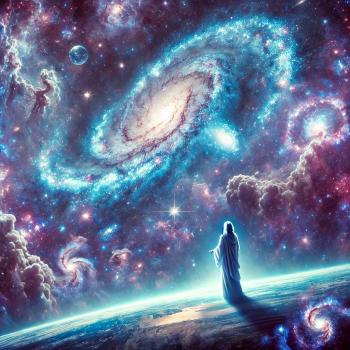Karma is better understood as the key to spiritual development: how our life situation can be transformed by transforming the motivations of our actions right now. When we add the Buddhist teaching about not-self -- in contemporary terms, that one's sense of self is a mental construct -- we can see that karma is not something the self has; rather, karma is what the sense of self is, and what the sense of self is changes according to one's conscious choices. I (re)construct myself by what I intentionally do, because my sense of self is a precipitate of habitual ways of thinking, feeling, and acting. Just as my body is composed of the food I have eaten, so my character is composed of conscious choices: "I" am constructed by my consistent, repeated mental attitudes. People are "punished" or "rewarded" not for what they have done but for what they have become, and what we intentionally do is what makes us what we are. An anonymous verse expresses this well:
Sow a thought and reap a deed
Sow a deed and reap a habit
Sow a habit and reap a character
Sow a character and reap a destiny
What kind of thoughts do we need to sow? Buddhism traces back our dukkha, "dissatisfaction," to the three unwholesome roots of evil: greed, ill will, and delusion. These problematic motivations need to be transformed into their positive counterparts: generosity, lovingkindness, and the wisdom that realizes our interdependence with others.
Such an understanding of karma does not necessarily involve another life after physical death. As Spinoza expressed it, happiness is not the reward for virtue; happiness is virtue itself. We are punished not for our "sins" but by them. To become a different kind of person is to experience the world in a different way. When your mind changes, the world changes. And when we respond differently to the world, the world responds differently to us. Insofar as we are actually not separate from the world, our ways of acting in it tend to involve feedback systems that incorporate other people. People not only notice what we do; they notice why we do it. I may fool people sometimes, yet over time, as the intentions behind my deeds become obvious, my character becomes revealed. The more I am motivated by greed, ill will, and delusion, the more I must manipulate the world to get what I want, and consequently the more alienated I feel and the more alienated others feel when they see they have been manipulated. This mutual distrust encourages both sides to manipulate more. On the other side, the more my actions are motivated by generosity, lovingkindness, and the wisdom of interdependence, the more I can relax and open up to the world. The more I feel part of the world and genuinely connected with others, the less I will be inclined to use others, and consequently the more inclined they will be to trust and open up to me. In such ways, transforming my own motivations not only transforms my own life; it also affects those around me, since what I am is not separate from what they are.
This more naturalistic understanding of karma does not mean we must necessarily exclude other, perhaps more mysterious possibilities regarding the consequences of our motivations for the world we live in. What is clear, however, is that karma as "how to transform my life situation by transforming my motivations right now" is not a fatalistic doctrine. Quite the contrary: it is difficult to imagine a more empowering spiritual teaching. We are not enjoined to accept and endure the problematic circumstances of our lives. Rather, we are encouraged to improve our spiritual lives and worldly situation by addressing those circumstances with generosity, lovingkindness, and nondual wisdom.
This article was first published by Tricycle: The Buddhist Review and is reprinted with permission.
David Loy is a professor of Religion at Xavier University and an authorized Zen teacher. This article is from his new book Money, Sex, War, Karma: Notes for a Buddhist Revolution (Wisdom Publications).




